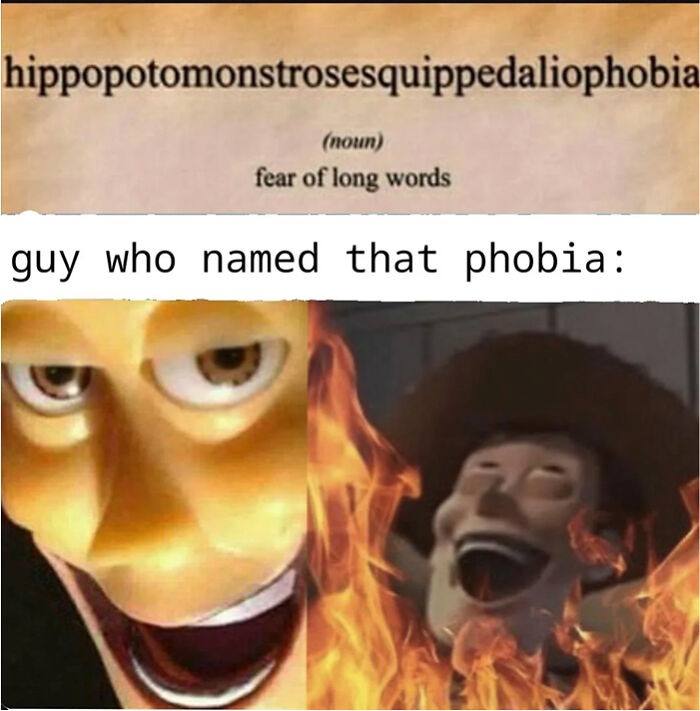The Irony Behind the World’s Cruelest Phobia Name Will Shock You.
Isn’t it just hilarious—and a tad cruel—that the fear of long words is tagged with a word so absurdly gigantic it could probably qualify for its own zip code? Meet hippopotomonstrosesquippedaliophobia, a 36-letter monster that ironically might give those who suffer from it an anxiety attack just by being pronounced. Seriously, who in their right mind thought naming a phobia after a word that’s basically a linguistic marathon was a good idea? This quirky paradox not only tickles the funny bone but also nudges us to ask: How much do our words really shape what we fear? While this phobia creeps on the fringes of clinical recognition, it’s leapt into pop culture limelight—sparking memes, TikTok chuckles, and even awkward moments on spelling bees. Beneath the humor lies a real conversation about overlooked anxieties that don’t often get the spotlight. So buckle up, because this isn’t just a goofy tongue twister—it’s a peek into how language can both ignite and soothe our deepest fears.
It’s certainly oddly fitting that the fear of long words is named with one of the longest words in the English language: hippopotomonstrosesquippedaliophobia. This 36-letter word is practically a punchline, since it may trigger the very social anxiety it defines.
This linguistic paradox prompts questions about how language shapes our understanding of fear and how society handles deeply personal phobias that fall outside the mainstream.
At the same time, it shows how whimsical our words are when given a meaning.
In recent years, the term has become a pop culture curiosity, surfacing in serious discussions and viral, funny moments. You’re unlikely to hear hippopotomonstrosesquippedaliophobia in everyday conversation due to its absurd length, but it still has intriguing linguistic roots and a surprisingly rich presence in media.
More than anything, it highlights the blurry line between genuine psychological issues and the humorous, sometimes dismissive ways we respond to them.
What is the Fear of Long Words?
Image credits: picture alliance / Getty Images
Hippopotomonstrosesquippedaliophobia, sometimes shortened to sesquipedalophobia, describes an intense fear or anxiety response triggered by encountering long words, whether in reading or conversation.
Psych Central noted in 2022 that the term isn’t officially recognized by the American Psychiatric Association’s DSM-5, which can lead people to misidentify their symptoms as general anxiety.
The phobia is often listed among more unusual conditions, like the fear of hair, dinner parties, or belly buttons. Yet while some odd phobias spark curiosity or compassion, this one is more frequently brushed off in clinical settings and casual conversation alike.
Some psychologists view it as a form of social phobia with serious emotional effects. Because so many dismiss it as irrational, people who experience it often lack access to useful coping strategies.
The name can be a trigger, making avoiding long words an understandable, if frustrating, struggle.
The Most Ridiculous Name in Psychology?
Beyond its ironic definition, the word hippopotomonstrosesquippedaliophobia is also undeniably over-the-top. Even if it referred to something else entirely, its sheer complexity would make it difficult to use in any practical context.
Image credits: r/memes
BBC Science Focus Magazine reported in 2023 that the word can trace its roots back to the Roman poet Horace, who used the phrase “sesquipedalia verba” in the first century BCE to mock overly long words in poetry.
The modern term stitches together parts of other big-sounding words—“hippopotamus,” “monstrous,” “sesquipedalian”—and finishes with “phobia.”
Poet Aimee Nezhukumatathil is credited with coining the full-length version in 2000. Some find humor in the coincidence of her having a long surname, but no evidence factored into her choice.
Given Horace’s original satire, some speculate that her decision to stretch the word even further was meant as a clever jab at academic excess.
While Nezhukumatathil hasn’t confirmed her intent, a common theory suggests the word serves as a playful but pointed comment on linguistics: how language can expose our vulnerabilities, stir anxiety, or even betray us.
When Science Meets Meme Culture
It makes sense that a fear of long words would grab attention, but hippopotomonstrosesquippedaliophobia has gone viral recently.
TikTok was the first to embrace the joke. A few videos make educational or genuine attempts to pronounce it, but most poke fun at the contradiction of a long word triggering fear.
@danielthrasher When you have hippopotomonstrosesquipedalaphobia #fyp♬ original sound – Daniel Thrasher
X platform saw a subtle joke from the Encyclopaedia Britannica account, while the Merriam-Webster dictionary chimed in by not officially recognizing the word at all.
Meme-heavy platforms like Reddit and Instagram have also turned the phobia into a punchline. Most of the humor focuses on the absurdity of the term itself, rather than ridiculing people who actually struggle with it.
















Post Comment